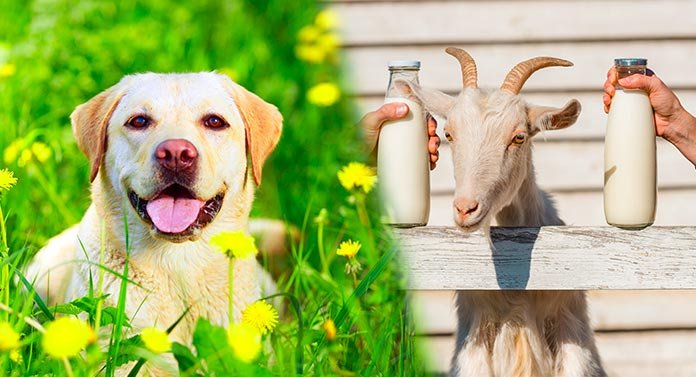Looking for a delicious and nutritious treat for your furry friend? Look no further than goat milk! But why is goat milk so paw-sitively good for dogs?
In this article, we’ll explore the benefits of goat milk for dogs, as well as some important considerations and creative ways to serve it. By the end of this article, you’ll be ready to give your pup a taste of this amazing superfood!
Table of Contents
Understanding a Dog’s Digestive System
Before we dive into the wonders of goat milk, let’s first understand how a dog’s digestive system works. Unlike humans, dogs are not designed to digest lactose, which is the sugar found in milk. Lactose intolerance is common in adult dogs, meaning they lack the enzyme lactase that breaks down lactose. As a result, cow’s milk can cause digestive upset in dogs, such as diarrhea, gas, bloating, and vomiting.
The Magic of Goat Milk for Dogs: 5 Reasons
So, if cow’s milk is bad for dogs, why is goat milk different? Well, goat milk has some unique properties that make it a great alternative for dogs. Here are five reasons why goat milk is a tail-wagging delight for dogs:
Easier to Digest than Cow’s Milk
One of the main advantages of goat milk is that it is easier to digest than cow’s milk. This is because goat milk has smaller lactose molecules than cow’s milk, which means they are more easily broken down by the dog’s digestive system. This also means that goat milk has less lactose than cow’s milk, making it more suitable for lactose-intolerant dogs. Goat milk also has a lower pH than cow’s milk, which helps to balance the acidity in the dog’s stomach and prevent acid reflux.
Natural Probiotics for Gut Health
Another benefit of goat milk is that it may contain natural probiotics, which are beneficial bacteria that live in the gut and aid digestion. Probiotics can help to maintain a healthy balance of microflora in the dog’s intestinal tract, which can boost immunity, prevent infections, and improve nutrient absorption. Goat milk is a rich source of probiotics, especially if it is raw or fermented, such as kefir or yogurt.
Packed with Essential Nutrients
Goat milk is not only good for the dog’s gut, but also for the dog’s overall health. Goat milk is packed with essential nutrients that dogs need, such as calcium, phosphorus, magnesium, potassium, iron, zinc, copper, selenium, vitamin A, vitamin B, vitamin C, vitamin D, and vitamin E. These nutrients can help to support the dog’s bones, teeth, muscles, nerves, blood, immune system, vision, skin, and coat.
A Potential Skin and Coat Soother
Speaking of skin and coat, goat milk might also have a soothing effect on the dog’s skin and coat. This is because goat milk contains healthy fats, such as medium-chain triglycerides (MCTs) and omega-3 fatty acids, that can moisturize the skin and coat and reduce inflammation. Goat milk also has anti-inflammatory and anti-microbial properties, which can help to heal skin infections, wounds, and allergies.
A Delicious and Hydrating Treat
Last but not least, goat milk is a delicious and hydrating treat for dogs. Many dogs simply enjoy the taste of goat milk, which can be a great way to reward them or show them some love. Goat milk can also be a good source of hydration, especially for picky drinkers who don’t drink enough water. Hydration is important for the dog’s health, as it helps to flush out toxins, regulate body temperature, and prevent dehydration.
Important Considerations Before Offering Goat Milk

While goat milk has many benefits for dogs, there are also some important considerations to keep in mind before offering it to your pup. Here are some tips to ensure a safe and positive experience with goat milk:
Start Slow and Monitor
As with any new food, it is advisable to introduce goat milk gradually to your dog’s diet, starting with small amounts and increasing over time. This will help to avoid any potential digestive issues, such as diarrhea, gas, or vomiting, that might occur due to a sudden change in the dog’s diet.
Also Read: 5 Super Good Traits of Pitbull Rottweiler German shepherd Mix
It is also recommended to monitor your dog for any signs of intolerance or allergy to goat milk, such as itching, swelling, or hives. If you notice any adverse reactions, stop giving goat milk and consult your veterinarian.
Consult Your Veterinarian
Before giving goat milk to your dog, it is always a good idea to consult your veterinarian, especially if your dog has any specific health conditions, such as kidney disease, diabetes, or pancreatitis.
Your veterinarian can advise you on the appropriate amount and frequency of goat milk for your dog, as well as any potential interactions or contraindications with other medications or supplements. Your veterinarian can also help you to choose the best quality and source of goat milk for your dog.
Choose Plain and Unsweetened Goat Milk
When buying goat milk for your dog, make sure to choose plain and unsweetened goat milk, as flavored or sweetened goat milk options might contain artificial ingredients, additives, or sugars that are unhealthy for dogs.
Avoid goat milk products that have added flavors, such as vanilla, chocolate, or caramel, or sweeteners, such as honey, maple syrup, or agave nectar. These can cause dental problems, weight gain, or even toxicity in dogs.
Creative Ways to Serve Goat Milk to Your Dog

Now that you know the benefits and considerations of goat milk for dogs, you might be wondering how to serve it to your pup. Here are some creative ways to incorporate goat milk into your dog’s diet:
- Mix it with your dog’s food: You can simply add some goat milk to your dog’s regular food, whether it is dry, wet, or raw. This will enhance the flavor and nutrition of your dog’s meal, as well as provide some extra hydration.
- Freeze it as a treat: You can also freeze some goat milk in ice cube trays or molds and give it to your dog as a frozen treat. This will be a refreshing and satisfying snack for your dog, especially on hot days.
- Make it into a smoothie: You can also blend some goat milk with some fruits, vegetables, or peanut butter and make it into a smoothie for your dog. This will be a tasty and healthy drink for your dog, as well as a way to sneak in some extra fruits and veggies.
- Bake it into a cookie: You can also bake some goat milk into a cookie for your dog, along with some oatmeal, eggs, and honey. This will be a crunchy and chewy treat for your dog, as well as a way to use up any leftover goat milk.
Conclusion
Goat milk is a tail-wagging delight for dogs, as it offers many benefits for their digestion, nutrition, skin, coat, and hydration. However, it is important to introduce goat milk slowly and carefully to your dog, and consult your veterinarian before doing so. If you follow these tips, you can enjoy the potential of goat milk to make your pup happy and healthy (in moderation!).

